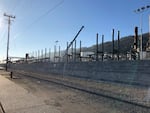
Construction continues at the Zenith Terminals site in Northwest Portland in early February, 2019.
Tony Schick / OPB
The city of Portland has denied a request from Zenith Energy to install three additional pipes at its oil terminal in the northwest industrial area.
The city's Office of Community Technology sent a rejection letter to the company on Friday saying officials couldn't be sure the pipes proposed to run under NW Front Avenue wouldn't be used to transport fossil fuels.
Furthermore, the letter said the city can’t trust Zenith to accurately report what might be flowing through the pipes because the company is already failing to meet city requirements.
Zenith had told the city the new pipes would be used to transport renewable biodiesel and a liquid intermediate known as MDI, or methyl diphenyl isocyanate, which is used to make plywood and particle board.
The company currently receives crude oil from trains and stores it in tanks at its terminal, and it is in the process of adding to its capacity to unload rail cars. It uses existing pipes to transport the oil to outgoing ships. But company officials were adamant that the new pipes wouldn't be used for fossil fuels. They even invited the city to inspect the pipes to be sure they weren't violating a city resolution opposing any expansion of fossil fuel infrastructure.
The city's rejection is a victory for opponents of the Zenith project, who are hoping the city will use its authority to shut down Zenith's crude oil operations.
Environmental groups oppose the project because they say it flies in the face of the city's resolution and contributes to climate change.
In her rejection letter, Elisabeth Perez, interim director of the city’s Office of Community Technology, said her office “is not prepared or equipped” to monitor and inspect the pipes to make sure they aren’t being used for fossil fuels.
Zenith had also offered to submit annual reports on the contents of the pipes, but Perez rejected that commitment because, she wrote, the company is already failing to meet existing requirements – including paying city franchise fees and filing reports on those fees.
She noted the company is more than five months overdue on a May deadline to pay its franchise fees for 2018.
“Zenith’s failure to meet these existing contractual commitments makes OCT unwilling to rely on the additional commitments in Zenith’s proposed condition,” she wrote. “If OCT cannot rely on Zenith to make its franchise fee payment on time and file the required report on time, then OCT also cannot rely on Zenith’s promise in its proposed condition to file annual reports about the products transported in the pipes.”
Portland Mayor Ted Wheeler said in a statement he supports the decision.
"I am deeply dedicated to protecting our environment. Portland’s commitment to be a climate leader nationally and globally requires a rapid transition away from fossil fuels to cleaner, renewable fuels and electrification of our transportation sector,” he said, according to the statement.
Opponents of Zenith's oil terminal say the city shouldn't trust the company given its history of failing to report major changes in its operations. Hundreds of opponents gathered at a meeting earlier this year to urge city leaders to stop the company from expanding its operations, and they have promised to do what they can.
Notes from a meeting between city officials and the company earlier this year suggest Zenith gave the city false information about whether its Portland terminal was handling crude oil from tar sands in Canada.
Dan Serres with the environmental group Columbia Riverkeeper said Zenith has changed its operations to ship more crude oil without much public involvement or notice to city leaders.
“The city, I think, agrees with concerns that many Portlanders have raised about whether the company can be relied upon to do what it says it’s going to do,” he said. “The city is, in our view, right to be very cautious here.”
Serres said he thinks it’s a bad idea to allow the company to transport MDI, adding “another toxic chemical to what is already a very dangerous oil train operation.”
According to the U.S. Environmental Protection Agency, that class of chemical can pose an inhalation hazard and has been documented to cause asthma and lung damage.
Zenith issued a statement Tuesday afternoon expressing disappointment with the city's denial of its request. The company also said it had "remedied the past due franchise fee" by making a payment on Monday.
